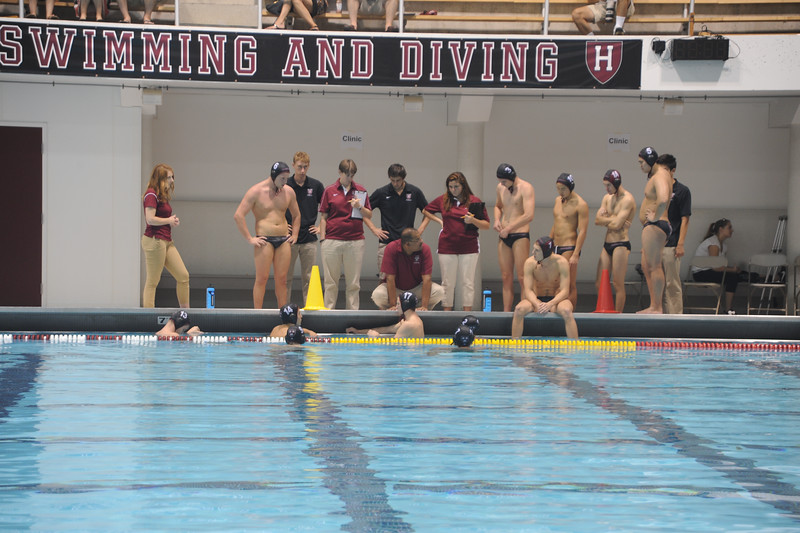
News
Cambridge Residents Slam Council Proposal to Delay Bike Lane Construction

News
‘Gender-Affirming Slay Fest’: Harvard College QSA Hosts Annual Queer Prom

News
‘Not Being Nerds’: Harvard Students Dance to Tinashe at Yardfest

News
Wrongful Death Trial Against CAMHS Employee Over 2015 Student Suicide To Begin Tuesday

News
Cornel West, Harvard Affiliates Call for University to Divest from ‘Israeli Apartheid’ at Rally
Trainers Play Key Role Behind the Scenes

Injuries in sports may be as inevitable as death and taxes, but the way these ailments are subsequently handled has the potential to define the strength of a team.
Fortunately, at Harvard, there’s an app for that—or rather, dozens of medically-trained professionals dedicated to making sure that student-athletes can recover both safely and soundly.
The strength of this underlying support system is dependent upon each individual trainer, but also upon the entire organization’s focus on research and education. After all, there’s much more to the system than just tending to injuries. The athletic training and sports medicine staff form a deep and far-reaching network that ensures the safety, health, and well-being of athletes, one that’s perhaps deeper than many realize.
According to head athletic director Brant Berkstresser, the department has a vast store of resources that athletes need to know that they can access. This makes the first priority, perhaps not surprisingly, educating players and coaches.
“The big point comes down to really trying to educate student-athletes,” said Berkstresser, a 2013 Dean’s Distinction Award Winner. “We try to educate them on the services that are available—the fact that we have certified athletic trainers within our athletic training room [who are] able to evaluate, treat, rehabilitate, and make return-to-play decisions in regards to athletic injuries and illnesses.”
Many of the trainers have degrees in kinesiology or athletic training and all have vast experience in the world of athletic training. The department has an internal medicine physician, an orthopedic surgeon, a digital x-ray with an x-ray tech in the athletic training room, a part-time sports dietitian, and a part-time chiropractor, all of which are readily available to Harvard athletes. The athletic trainers do everything from taping ankles for practice to walking a player through the concussion protocol.
Berkstresser emphasized the importance of educating players and coaches on hydration, nutrition, and heat illness during play, as well as perhaps the most hot-button topic of athletic injuries–concussions.
“We want to make sure our student athletes understand what the signs and symptoms of a concussion are, the significance of reporting them as soon as they notice them, and how that can really shorten the recovery time,” Berkstresser said.
For junior water polo defender Dan Stevens, the educational efforts of the department translated into a success story on the ground level.
Last year, he suffered a concussion two weeks ahead of the water polo team’s Northern Division championship tournament, a disheartening development for an integral player on the team. With help from athletic trainer Calleigh Fangmeyer, a graduate student at Boston University, though, he was able to both recover safely and eventually get back in the pool.
“Calleigh took me through the entire protocol, and she was very good, very safe, very accurate with her assessments,” Stevens said. “Most importantly, I’ve never had concussion-like symptoms again, so I think that’s huge and a testament to how she helped me handle my concussion.”
Berkstresser added that student motivation is another factor in the speed of the recovery process.
“It has to do with student-athletes who are highly motivated to play their sport,” Berkstresser said. “Not just for themselves, but from the standpoint of the team’s goals.”
In addition, injured athletes have a hard time swallowing the fact that they may miss games. Something that may not be written in a trainer’s job description, but is vital to their effectiveness, is their ability to connect with the athlete.
“Calleigh’s not only accurate from a medical perspective, but she treats us with compassion,” Stevens said. “A lot of the time, it’s a difficult decision for her when she has to make a call.”
Trainers’ goals are to tend to the ailments of athletes in a way that is safe, but also minimizes the time off the field. When one of Stevens’ teammates had forearm tendinitis, Fangmeyer the training staff focused on managing his reps and treating the injury on a week-by-week basis, allowing him to not miss too many games whilst still keeping the condition under control.
Such success stories, according to Berkstresser, aren’t all too rare.
“There’s a lot. You always have them,” Berkstresser said. “We had three football players this past fall who had some injuries—the average time would be about 6 weeks—and none of those guys missed a game.”
On a higher level, the sports medicine department supplements the work of every athletic trainer with cutting-edge research.
“One of the great things about medicine and athletics is that both of them are always evolving and changing fields,” Berkstresser said. “You’re constantly adapting and innovating, whether it’s technology, whether it’s from a medicine standpoint, or different manual therapy skills that are coming out. You really always have to evolve and make sure that you’re continuing to educate yourself as a health professional.”
At Harvard, Berkstresser is currently involved in aerobic and anaerobic studies on the heart, as well as a recently-launched project that aims to detail the biomarkers linked to concussions.
“Sometimes you can be challenged to do a differential diagnostic between a concussion and another ailment,” he said in regards to the pilot study. “Right now, there’s no objective data, you can’t MRI somebody, you can’t do a blood test—you have to go with what they tell you.”
The Harvard sports medicine department may be working on broadly-sweeping research, but for the athletes, it is the department’s day to day work that is most important.
Want to keep up with breaking news? Subscribe to our email newsletter.
